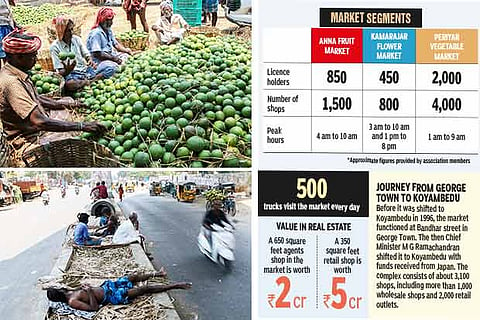For 10,000 labourers, Koyambedu market is both workplace and home
Chennai
When about 10,000 people live together in a place, it can be categorised as a community or village and when the footfall of visitors to a spot crosses one lakh daily, it can be dubbed as a commercial hub.
Koyambedu Wholesale Market Complex (KWMC) is a combination of both. Being one of the largest perishable goods market complexes in the continent, what transpires here regularly is nothing less than the workings of a major festival.
To handle such a heavy footfall, the complex requires a number of facilities to take care of the security and convenience of the shopkeepers and the customers, but apart from a management committee and a police booth, the 70-acre market has no other facility and hence, grapples with a lot of problems daily.
Besides making headlines owing to rising or falling prices of fruit and vegetable, the market complex also makes news because of simple assaults, murders and even arrests related to flesh trade. Such is the notoriety of the place that recently, J Francis Krupa—who has penned lyrics for songs in Tamil movies including Vennila Kabadi Kuzhu and co-written screenplay for the biopic on former chief minister K Kamaraj—was mistaken for a murderer as he tried to help an unconscious man.
The incident flashed on news channels and was reported in newspapers, but neither the labourers nor the association members in the market have any idea about it as they were busy with chores. So how exactly does the day in the life of a daily labourer here look like that no one took notice of an unconscious man?
Work around shops by day, sleep in it by night
Forty-two-year-old P Sureshkumar is originally from Thozhudhur in Cuddalore district, but has been working in the market as a daily wage labourer ever since he ran away from home 35 years ago.
“When I was seven, my friends and I came to Chennai in search of jobs and I started working in a tea shop for Rs 5 per day. When I was 15, I started working as a coolie in the market and used to earn Rs 0.75 to Rs 1.50 per tonne, but it was on Bandhar Street in George Town back then. When the market moved to Koyambedu, I came here,” said Sureshkumar.
He reconciled with his family 10 years after he ran away, got married and had children. On work front, his designation now is now mestri and he makes up to Rs 25,000 per month. “The daily income varies from Rs 100 to Rs 1,000 based on the demand and supply. When more labourers are available, the share gets lower,” he said.
Sureshkumar’s day starts at 4 am since he works for a commission agent in the fruit market as the loads start arriving at his godown. Based on the demands from various shops, he will have to carry the fruit to their shops. “Usually, the work gets over by 11 am after which I will go take bath, have lunch and go off to sleep in the afternoon,” he said. But, he must also be readily available if more goods arrive unexpectedly.
There are about 10,000 workers like Sureshkumar who live in the market and go home once in a month for a few days. And even though they get to live, work, eat and sleep in the market, life isn’t smooth for them. “In each shop, 10 to 20 workers struggle to find space to sleep while others choose to sleep on the terrace,” he said.
“Very few shops have toilets, so labourers from other shops have to depend on public toilets nearby and we are charged Rs 25 for that — Rs 20 for bathing and Rs 5 for urinating and defecating. Also, the public toilet shuts down at 10 pm and we have to wait till next morning to use it,” said Sureshkumar.
Speaking about their health problems, the 42-year-old said, “When we are ill, we have to go to RGGGH or KMC for treatment because there is no government hospital in the vicinity. In cases of urgent care, we visit a nearby private clinic.”
To survive and create a sort of bonhomie amid such adversity, workers from same districts stick together and help each other out. But ego clashes between the gangs prevent them from forming an association and streamline their work to get their essential needs taken care of.
In the last few years, the number of labourers from northern states has increased, but local workers do not find them as a threat.
The garbage clearing conundrum
Although it has separate sections for flowers, vegetables and fruit, the thought of Koyambedu market also brings up images of heaps of garbage and stench of rotting perishables.
S Srinivasan, the president of Chennai Fruit Commission Agent Association, said that the contract to clear the garbage from the market was given to a private agency for 11 years, but their efficiency has not been reviewed.
“The management committee is doing their work to the best of their capacity, but there are so many factors that cannot be controlled. Subletting of shops is rampant, which makes the market look cramped. While the actual licence holders are supposed to run the business, hawkers with political support run the show incurring loss to licensed shop owners,” said Srinivasan.
He added, “Earlier, trucks entering the market with imported goods need to have a valid permit, but it is not practised any more. Water is also a major problem here. We have to dig borewells on our own. Only when these problems are addressed, will the market meet expectations.”
Visit news.dtnext.in to explore our interactive epaper!
Download the DT Next app for more exciting features!
Click here for iOS
Click here for Android

